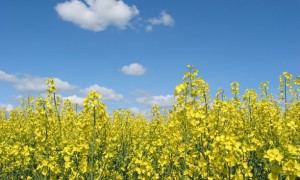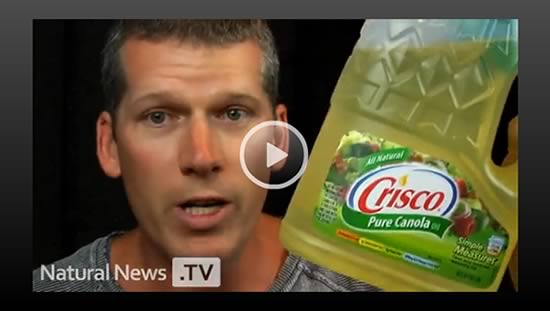 God never made a Canola plant, so where does Canola Oil really come from?
God never made a Canola plant, so where does Canola Oil really come from?
Canola comes from the Rapeseed plant, a member of the mustard family, it was genetically engineered and developed in Canada. It should really be named “Rapeseed Oil”. But who would buy that? Doesn’t sound very appealing. So it was given the name “Canola Oil” which stands for “Canadian oil, low acid” or “Canadian Oil”.
Let’s get down to some facts about Canola Oil / Rapeseed.
Rapeseed oil was originally used in light industry as a penetrating oil, not for human consumption. The FDA had actually banned it for human consumption in 1956. Later Canadian growers using genetic manipulation involving seed splitting (R.K. Downey, Genetic Control of Fatty Acid Biosnythesis in Rapeseed. Journal of the American Oil Chemists Society, 1964;41:475-478.), came up with new type of rapeseed in the 1970’s that was lower in the toxic erucic acid. A new name was developed for the oil to try and get away from the bad issues tied to rapeseed oil, canola oil.
Rapeseed, the most toxic of all food plants suddenly through genetic manipulation was made safe? The poisonous weed has been shown to cause emphysema, respiratory distress, anemia, constipation, irritability, and blindness in both animals and humans, is suddenly safe? One has to ask if God created a plant to be poisonous is it correct to think that man can change this just through some ability of his own?
How Canola Oil Is Made
Many of these highly processed cooking oils such as canola oil, cotton seed oil, and vegetable oil, are processed with many steps involving chemical solvents, de-waxers, neutralizers, steamers, bleachers and deodorizers before they make it to the store shelves. Here is a great video to see all that happens during the process. Pay attention to how many times they tell you by-products of the canola oil process are sold as animal feed. Beef cows don’t eat much grass anymore. This could be a good reason to look at grass-fed, grass-finished beef.
Do notice how the video pushes the health benefits of the omega 3s in canola oil. We will talk more later about what happens to these great omega 3s in the processing of canola oil.
Contains Hexane
Did you catch that part in the video where they talk about solvents being used to extract the other 40ish percent of canola oil from the canola cake that is left over after the high-pressure screw press. Notice, they don’t tell you the most often used solvent is hexane a byproduct of gasoline production. Hexane is a neurotoxin and it has been found that hexane residue will remain in the oil.
Another fact is the FDA does not require the food manufactures to test for residues. What harm this neuotoxin does when ingesting it is not known since most testing is done on the inhalation of hexane in industrial environments. You can guess, it must not be good.
Omega 3s Transformed
Canola oil is said to have healthy properties because of its high concentration of omega 3s. ONLY problem is the heat and pressure of manufacturing causes the omega 3s to go rancid. Now the oil has to be deodorized, “I mean it smells, really, really, really bad!” The deodorizing process causes these rancid omega 3s to transform into trans-fats. Yes, the bad for you trans-fats we are warned cause heart disease.
Many processed foods contain hydrogenated canola oil since it hardens up very well creating a structure for over blended highly processed foods. Not to mention it extends the shelf life of the product. This process actually raises the amount of trans-fats in processed foods to as high as 40% (J.L. Sebedio and W.W. Christie, eds, Trans Fatty Acids in Human Nutrition, The Oily Press, Dundee, Scotland, 1998, pp. 49-50), and it doesn’t have to be listed on the label, since trans-fats were not added to the foods, they were created in the production of the foods! Presto… trans-fat free labeled foods that are very high in trans-fats.
Just take a look at that label on the peanut butter that choosie Moms choose. You will find hydrogenated canola oil, by removing the peanut oil, which is sold in other products, and replacing it with hydrogenated canola oil it makes a thick peanut butter grease that sticks to the roof of your mouth and is very hard for the body to digest.
Great Insect Killer
The Rapeseed plants’ oil makes an excellent insect repellent. Canola oil is registered with the EPA as a pesticide, well it used to be in 2012, but somehow this listing just dropped off and now the EPA says it appears to not be harmful to humans. Wonder how that happened. Guess what? Canola oil must not have lost all of its toxicity because it is the primary ingredient in many “organic” pesticide products used on vegetables. Vegol Year-Round Pesticidal Oil lists Canola Oil as the active ingreredent at 96% of the product, the remaining 4% is labeled as other ingredients which are not active… meaning not toxic, (usually coloring, thickening agents, preservatives, etc.). The label even states “CAUTION: Avoid contact with skin or clothing.” Wait there is more, this canola oil-based pesticide also says on the label: ” Enviromental Hazards: Do not apply directly to water. Do not contaminate water when disposing of equipment…”. If you do get it on your skin the label says to rinse with water for 15-20 mins. and then “Call a poison control center or doctor for treatment advice.”
I looked at bottles of canola oil in the grocery store and did not find any “CAUTION or Enviromental Hazards” warnings on the labels.
All I saw was that they contained 100% canola oil, which would be the active ingredient. How can an item be hazardous for humans and animals at 96% purity, but appears safe for humans and animals at 100% purity? Some people have sent me comments suggesting that it is the 4% other ingredient that is the toxic part. But, the EPA would require that this 4% be labeled as active, and it is not.
VIDEO – Are you eating pesticides? Canola oil a great insect killer.
Avoid Canola Oil at all costs.
Though the FDA has placed Canola Oil on the GRAS list (Generally Regarded As Safe), you can see from the facts that this is one oil you want to avoid at all costs.
Do you want to feed your family a genetically engineered toxic oil? My personal answer is a resounding NO!
The sad thing is, Canola Oil is so cheap, that it is used in most processed foods. You will find it in everything from breads, margarine, potato chips, to fast food, etc. The list goes on and on. This is one of the many reasons it is SO important to READ READ READ the labels carefully before you buy any food. And we already know there are a number of reasons to stay away from fast food.
The bottom line is Canola, which comes from rapeseed, is a modified food, it is not natural. Canola Oil is NOT a “God Food”.
What IS the healthiest oil for cooking?
The best, healthiest oil out there is Virgin Coconut Oil. The Medium-Chain-Fatty-Acids (MCFAs) are beneficial to your body/health in many ways. It is great to cook with, can take heat up to med-high, and can be added to smoothies for an energy boost.
I could go on and on about this, but you will want to pick up the book Eat Fat, Lose Fat by Dr. Mary Enig and Sally Fallon. This book discusses the many benefits of coconut oil in greater depth, along with some recipes.
*Originally published June 1, 2012, updated June 18, 2015.
